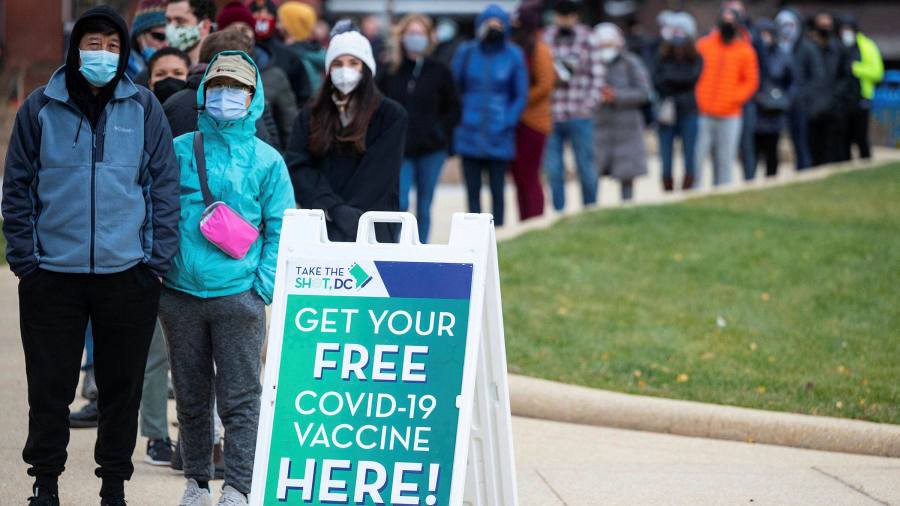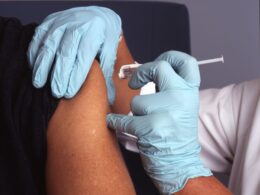Financial Times
December 2, 2021.
The global vaccine emergency is tailor-made for a tarnished America to rebrand itself.
At pennies on the dollar, the US could put a stars and stripes on the fight against the pandemic and show itself capable of giving the world’s poor what they need, as opposed to lecturing from a distance.
Geopolitical chances such as this do not arise very often. As an opportunity for enlightened self-interest, it compares to George Marshall’s massive postwar aid programme. That secured the loyalty of western Europe at the start of the cold war.
A US-led vaccine drive could have a critical impact on the shape of what looks like a new cold war with China.
There is still time for President Joe Biden to grasp that mantle. So far, however, he is treating the global vaccine gap as a second-level priority.
Though the US has pledged 1bn doses to the world’s poorer countries, just 111m have been shipped, which is enough to give 5 per cent of Africa one dose, according to the World Bank’s Multilateral Data Dashboard.
By contrast, the US has secured two and a half times what it will need for its own people, which will leave more than 1bn surplus shots. Some countries, such as Canada, which have ordered eight times what they need, are even more solipsistic.
Overall, the G7 countries have ordered 2.9bn more vaccines than they require.
Covid-19 offers a test of whether democracies can deliver. Biden has framed America’s great power competition with China and Russia as a battle between democracy and autocracy. Most of the world’s poor, and an increasing share of those living in the west, pay little attention to such abstractions.
What will move people in continents such as Africa is material improvements to their lives.
Next week Biden will host a virtual democracy summit — a centrepiece of his foreign policy. It is meant to strike a sharp contrast with Donald Trump’s open contempt for values-based diplomacy.
In practice, needles in people’s arms would do more than a thousand such summits to get the world’s attention.
Helping foreigners would also boost Biden’s prospects at home. Within a week, news of the Omicron variant, which was first detected in southern Africa, has led to downgrades in US growth prospects and supply chain-related increases to its inflation forecasts.
The worsening outlook is already imposing far higher costs on the US economy than the small change it would take to vaccinate the world.
This year the IMF estimated it would cost $50bn to inoculate 60 per cent of the world by mid-2022. Even if that is an underestimate, the outlay is less than 3 per cent the size of Biden’s “build back better” legislation.
As ever, domestic politics is monopolising the White House’s bandwidth. Though Biden’s chief of staff, Ron Klain, headed Barack Obama’s pandemic unit when Ebola struck in 2014, Klain’s priority is to boost the Democratic party’s chances of winning next year’s midterm elections.
Biden says all the right things on global vaccines. But his actions do not match his pledges. There is no administration tsar to lead the drive.
Given the Kafkaesque difficulty of getting Washington’s inter-agency system to do anything at speed, only a big name with Biden’s personal stamp could galvanise the system. No one knows who that is. Jake Sullivan, Biden’s national security adviser, has a thousand fires to fight. Samantha Power, the head of USAID, would be an obvious choice. It is past time for someone in her position to be given ownership.
Biden’s second headache is the Republicans, who see Covid-19 as a chance to further sink his ratings. The party is threatening to shutter the US government unless Democrats strip it of funding for Biden’s employer vaccine mandate, which itself is now being held up by Trump-appointed judges.
Faced with such cynicism over a virus that has claimed 780,000 American lives, Biden’s distractedness is understandable.
He is nevertheless the only American who can seize the moment and transform the country’s standing.
Caution is sometimes the riskiest stance of all. In the past decade, the world was amply warned of a coming pandemic and did little to prepare. That is one thing.
Today’s warnings of new variants are not theoretical. We see the instant global convulsions.
If ever there was a chance for America to step up, that would be now.
Originally published at https://www.ft.com on December 2, 2021.












